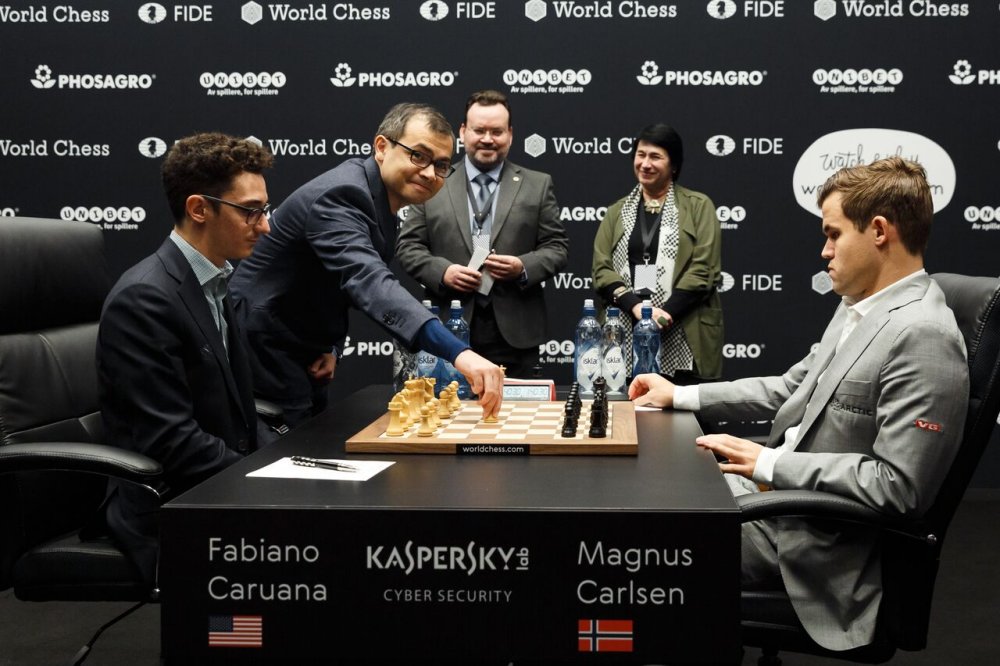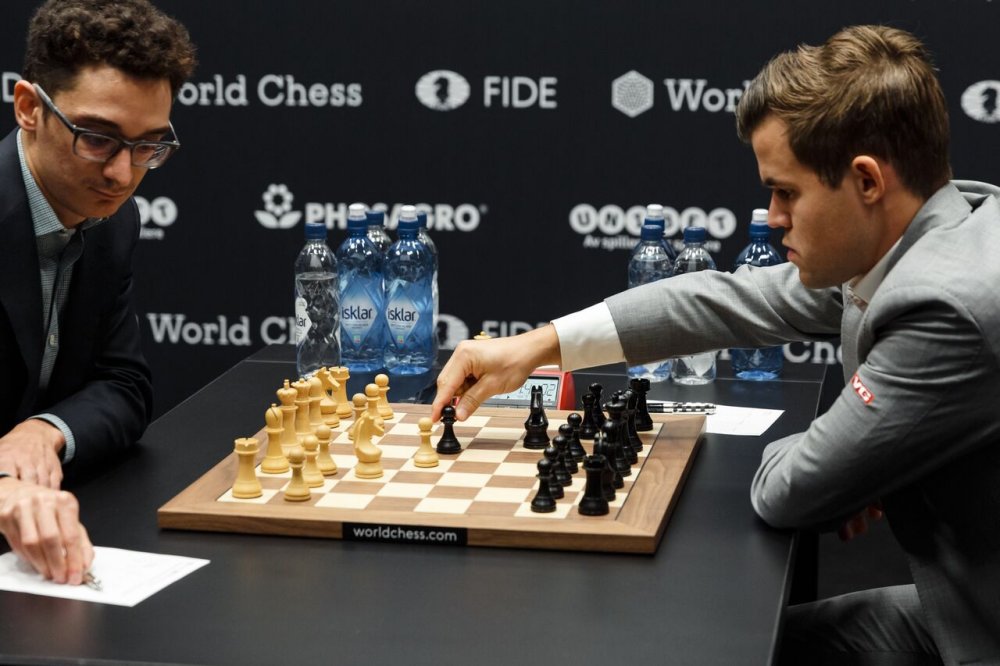


The Sveshnikov Variation of the Sicilian
The Sveshnikov Variation of the Sicilian is one of the most popular and fascinating replies to 1.e4. Right from the beginning, Black is striving for active and dynamic counterplay, and this results in a double-edge struggle for the initiative. Dutch top grandmaster and six-times national champion Loek van Wely himself has played the Sveshnikov since 1998. On this DVD he comments on his latest encounters with world-class players like Shirov, Anand, Topalov and Kramnik, games which abound with combinatorial ideas and sacrifices; a feast for all fans of tactics.
Eight games, eight draws, the chess fans grumble. preferring to see some decisive games between Magnus Carlsen and Fabiano Caruana. Yet far from boring, some of these draws have been balanced on a knife's edge. We've been here before: Magnus Carlsen worked out what could have been a clear win in the first game, but then didn't play it. Fabiano Caruana was tantalisingly close to victory in the sixth game last Friday — at least for those with the benefit of super-strong computers — but couldn't break Carlsen's fortress.
German Grandmaster Robert Huebner wrote in his first half analysis (in German):
"It is not, however, the goal of the World Championship participants to entertain the spectators as effectively as possible. They are concerned with achieving the best possible result. It seems to me a strange contradiction to demand, on the one hand, the content of the games be "thrilling" when, on the other hand, recognising that the element of competition is paramount. If the result is the most important thing, you have to leave it to the players how they want to pursue their goals; they will know best."
The posture of each player speaks for itself 🙃 #CarlsenCaruana @theworldchess pic.twitter.com/LFCu11aBGP
— Niki Riga (@riga_niki) November 19, 2018
Apparently, Carlsen's choice of socks was subject to revision — they mysteriously went from bright red to black during the game!
Monday was the eighth game and the eighth straight draw, tying the record for most consecutive draws to start a World Championship set by Garry Kasparov And Viswanathan Anand, in their 1995 match in New York.

Demis Hassabis, who made the first move, was studying computer science at the University of Cambridge in 1995
This time Caruana had to carry the "burden" of the white pieces again after Carlsen was "forced" to play White in back-to-back Games 6 and 7. It's become a bit of a running joke to say that White used to be considered to have an advantage before this match between the two best players in the world. In London, White had so-far failed to gain the upper hand and, on the contrary, the Black player has been closer to winning on a few occasions.
When Caruana pushed 3.d4 — eschewing the Rossolimo we saw in previous games — the question then became which open Sicilian variation Carlsen would choose?

No Rossolimo this time!
It turns out Carlsen had prepared the Sveshnikov. This sharp variation has been deeply analysed, particularly in the main line after 7.Bg5, where White has a hard time playing for a significant advantage.
My best games in the Sveshnikov
The Sveshnikov Variation of the Sicilian Defence is considered one of the most promising replies to 1.e4, often giving rise to sharp and complex positions which require precise and inventive play from both sides. Thus, an opening tailor-made for Alexei Shirov (FIDE World Cup finalist in 2007), who has included it into his repertoire with both White and Black and knows the mutual tricks and traps all too well.
Caruana took a different approach with 7.Nd5 and was excellently prepared. For the first time in this World Championship, White came out of the opening with a noticeable advantage.
GM Peter Leko, the 2004 World Championship challenger, commenting on the Chess Club and Scholastic Center's live show "Today in Chess" said:
“With Nd5 you basically force the game into your territory and this is one of the things that the team members really like because they can devote their time and try to find some specific idea where we’re going to try to surprise Magnus and not worrying that he’s going to surprise us again”.
Carlsen responded to White's queenside pawn majority with the aggressive thrust 8...g5, going for counterplay at the expense of opening holes in his kingside.
Leko:
"Basically these aggressive intentions from the black side are the way to create enough dynamics to counterbalance the problem that you are facing on the queenside. Now we are seeing some position where time is a huge factor. It’s clear that if White gets two extra tempi and gets b4-c5 in then Black’s position will just collapse.”
Caruana did manage to make a key queenside break with 21.c5 and secured a passed d-pawn, but he hesitated at a moment when chess engines' evaluation in favour of White reached their apex on move 24.
At this critical point, 24.Qh5 is more testing, and Caruana mentioned the line 24...Bg6 25.Qh6 in the post-game press conference as something he considered. Instead, the Challenger played the more timid 24.h3, much to Carlsen's relief, as he immediately removed the option of Qh5 with 24...Qe8. Soon the queens were exchanged and an endgame with opposite-coloured bishops made a draw most likely. On the 38th move, Caruana offered and a draw was agreed.
My best games in the Sveshnikov
The Sveshnikov Variation of the Sicilian Defence is considered one of the most promising replies to 1.e4, often giving rise to sharp and complex positions which require precise and inventive play from both sides. Thus, an opening tailor-made for Alexei Shirov (FIDE World Cup finalist in 2007), who has included it into his repertoire with both White and Black and knows the mutual tricks and traps all too well.
GM Daniel King provides a 5-minute look at the main events of the day:
Leko was a second for Vladimir Kramnik in his match against Anand in Bonn, 2008. As Anand explained himself on "Today in Chess" during Sunday's Game 7, his opening preparation was working best in the first five games against Kramnik. Leko reports having the feeling that if the match had been longer the situation would have changed in favour of Kramnik: “There were simply not enough games and Vishy won the match deservedly”.
In 2013, Leko then worked for Anand against Carlsen in Chennai. They managed to out-prepare Carlsen in the first three games, but Magnus played the Berlin Defence in Game 4 and that changed the psychological dynamic of the match because Carlsen got a boost of confidence as he became more secure with the black pieces. Leko drew a parallel to Caruana's effort in Game 2 in London.
It's worth remembering that the first player to win a game hasn't necessarily fared well historically. Anand lost a game to both Topalov in 2010 and Gelfand in 2012 before going on to win both matches. And of course, Carlsen lost Game 8 to Karjakin in 2016 (see Carlsen vs Karjakin 2016 revisited). Leko articulated why that pattern may have played out before:
“I think winning a game is extremely important but it’s just the beginning of the match. There are still a lot of games and it’s typically also the dynamic of a match [that] once somebody wins, the other one gets much more angry — gets somehow much more focused because he knows he needs to strike back...Until the score is even you know that there is nothing to lose…you have to go for it, and this also gives your opponent a chance and the whole match gets wide open.”
Each passing draw makes a win even more valuable, but also a dramatic rapid tiebreak more likely.
You can read Wesley So's comments, then watch him think through a trio of devilish studies.
"I can't help wondering though why Magnus sticks to the Sicilian in these games. Against Sergey Karjakin two years ago he only played 1...e5 and had absolutely no problems."
Opening package: 1.b3 and Black Secrets in the Modern Italian
Wesley So published two new opening DVDs: 1.b3, the so called Nimzo-Larsen-Attack, for White and his black secrets in the modern Italian. Get them in a package and save money!
ChessBase Account Premium annual subscription
At the airport, in the hotel or at home on your couch: with the new ChessBase you always have access to the whole ChessBase world: the new ChessBase video library, tactics server, opening training App, the live database with eight million games, Let’s Check and web access to playchess.com
Translation from German and additional reporting: Macauley Peterson
| Advertising |